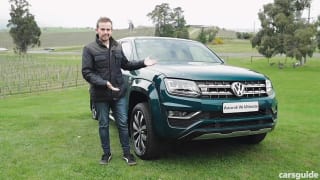
Volkswagen Amarok 2019 review: Ultimate 580
The Volkswagen Amarok V6 Ultimate 580 is the new flagship version of the German brand's dual-cab ute, with more grunt, more gear - but it crucially still misses out on safety stuff.
Browse over 9,000 car reviews
Ford's Ranger Raptor is the right car at the right time for the Australian new car market.
Just as V8 Commodores and turbocharged Falcons start leaving driveways, they're increasingly being replaced by diesel dual cabs with all the gear.
The Raptor lands just at the right time to make a splash, shaking the established dual cab hierarchy up by introducing our ute-obsessed population to a new kind of performance car. One where an engine is less important than other attributes.
Does the Raptor really hit its mark? Can it possibly live up to its self-generated hype? I drove one for a week to find out.
| Ford Ranger 2020: Raptor 2.0 (4X4) | |
|---|---|
| Safety rating | |
| Engine Type | 2.0L turbo |
| Fuel Type | Diesel |
| Fuel Efficiency | 8.2L/100km |
| Seating | 5 seats |
| Price from | $70,400 |
Naturally, as a hero car, the Raptor is not cheap. Coming in at $76,290, it's leagues above old fan favourites, like the HiLux SR5 ($57,240) and Navara ST-X ($48,150). The only trucks price-competing in this space are relatively recent newcomers, like Volkswagen's Amarok Ultimate 580 ($72,790), the Mercedes-Benz X-Class 350d Power ($79,415) and Ram's 1500 (from $79,950).
Whether those competitors will appeal to you will largely depend on a few things, as at this end of the market each are quite different. The VW's hero feature is its Porsche-derived 3.0-litre V6 engine, the Benz' is its V6... plus the three-pointed badge, and the Ram's is its American styling and petrol V8.
Instead of making it all about the powertrain, the Raptor instead makes it about looks and capability.
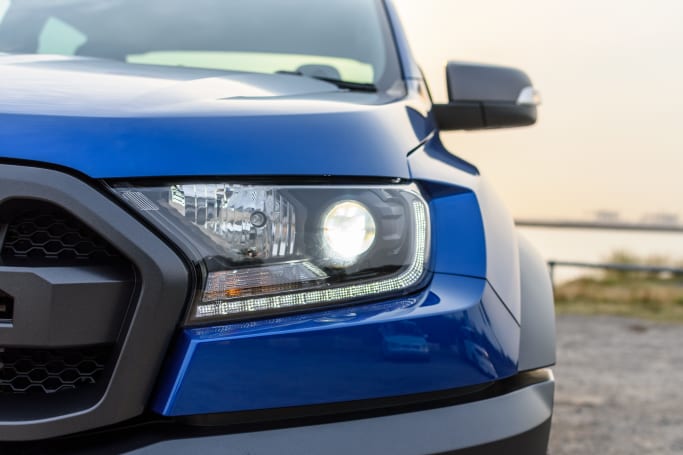
Much of your extra $11,000 over the next-rung-down Wildtrak vanishes into completely overhauled suspension components sourced from off-road specialists Fox Racing Shox.
Though, that's not quite all there is to it. The Raptor gets bespoke styling, with extra pumped guards, 17-inch Ford Performance alloy wheels wearing 33-inch BF Goodrich all-terrain KO2 Tyres, grey styling highlights throughout the body, a bespoke Raptor trim, seats and carpet for the interior, a 4.2-inch screen between the Ford Performance dial clusters, unique side steps, and 'heavy duty' underbody protection.
Our car was also wearing 'Lightning Blue' paint ($650) and 'Raptor Decals' ($750). That's pretty much all there is when it comes to options.
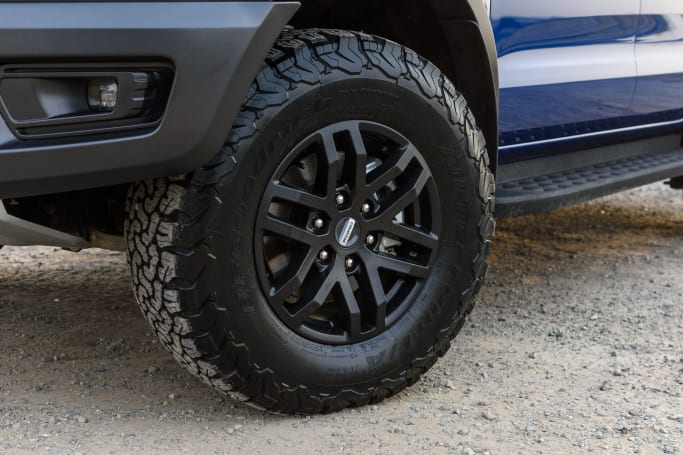
Regular features are great, too, with the Raptor shipping standard with almost everything its Wildtrak stablemate gets, like LED front lighting, a tub liner for the tray with a 12-volt power outlet, keyless entry and push-start, leather trimmed wheel and gear knob, dual-zone climate control, a cooled centre console box, auto-dimming rear vision mirror, and a full-size household power socket for rear passengers.
An 8.0-inch multimedia touchscreen with Ford's Sync3 operating system is one of the best in the biz. It also offers Apple CarPlay and Android Auto connectivity, DAB+ digital radio, and built-in sat-nav which isn't terrible.
It's hard to say that $76,290 is great value, but there's not much stopping Ford from charging more. The brand tells us that Raptors are flying off lots so fast it's tough for it to build enough of them.
Can you argue that the Ranger doesn't look totally tough? It has proper presence on the road, towering over other dual cabs, and even the largest seven-seat SUVs.
All the dark grey highlights draw attention to this truck's best bits, like the massive wheels, big 'FORD' emblazoned grille and pumped guards.
The enormous dimensions, dwarfed only by perhaps Ram's 2500, make you the meanest, most dinousaurest looking thing on the road.
It's a brilliant move for Ford, too, because the Raptor is nothing less than a marketing beacon that can be seen for miles. We'd argue its cheeky for them to charge so much for the Raptor stickers, but even the colours look good.
Inside is a bit more sedate in the scheme of things, but certainly elevated over the regular Ranger's cabin. Touches like the sportier steering wheel with Raptor-specific touches, a unique, edgier colour scheme with flat greys and metal textures, and the blue stitching that runs through everything all add to the Raptor's feel.
The seats deserve special mention, as they not only look good, but are some of the most comfortable thrones in the dual-cab world.
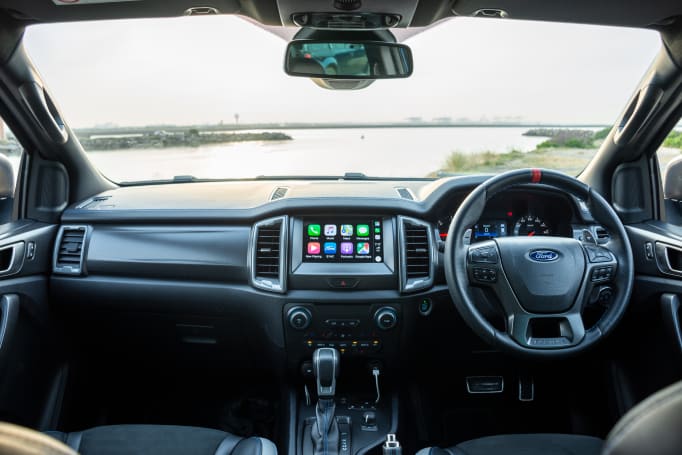
The symmetrical dash layout makes the most of the big touchscreen, and the soft dash topper is more car-like in its execution than many competitors.
The whole package is a bit… flashy though. You can hardly buy a Raptor to be anonymous or avoid people ogling it. Especially if you're using it to trundle around a capital city, where it stands out even among the largest vehicles on the road.
Obviously, there are drawbacks to having such a wide track, not least of which is navigating tight city alleyways and regulation-sized car parks.
But aside from watching your corners, the Raptor's inbuilt abilities make it total overkill for dealing with most terrain. Even mounting the kerb to get to a work site is a cinch for its huge tyres.
The cabin is as practical as any other Ranger, and that's a very good thing. Jumbo sized bottle holders exist in the centre console and doors, while a massive trench under the climate controls will eat phones, wallets, even tools with ease.
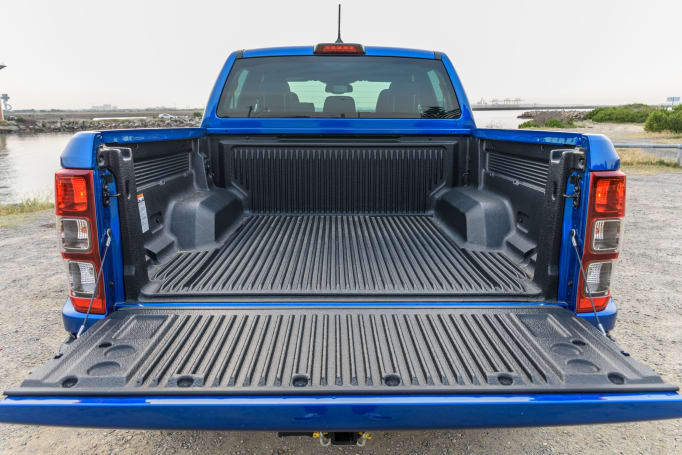
It doesn't have the laptop charging bay the Amarok has atop its dash, but it does sport a cooled console box and largish glove box. Unlike many dual-cabs, there is an abundance of plush surfaces for elbows and knees for those in the front seats.
Room is great for front passengers, too, and well above average for rear passengers, although clambering up into the thing is made a bit difficult due to its extra height.
Mercifully, the side steps are massive, with a rugged material for plenty of grip, and front passengers get a chunky grab-handle on the inside of the A-pillar.
There are no air vents for rear occupants, but they do get the same soft touch points, a drop-down armrest with two cupholders and a full-size household power outlet and 12-volt outlet.
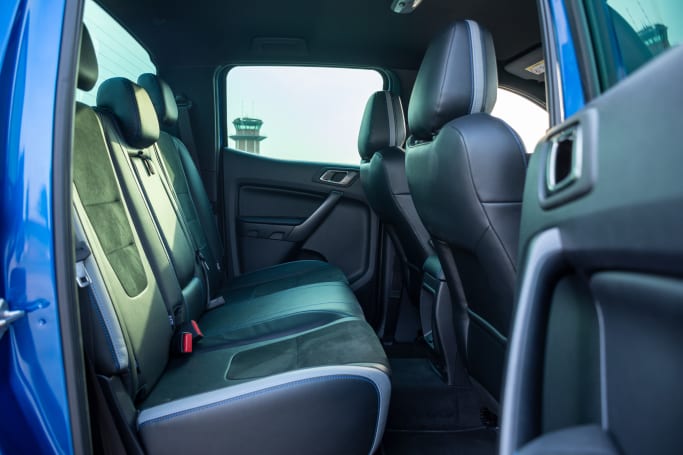
Visibility is awesome thanks to the huge wide-angle mirrors, although it is genuinely difficult to tell where the end of the nose is thanks to the ride height.
The Raptor comes with a tub liner in the tray, with a power outlet and cupholders built in. It would be nice to see a factory roller cover like the Wildtrak gets, but there's a good chance buyers will fit one of their liking aftermarket anyway.
It is worth noting that the Ranger's tray is not one of an exclusive club that can hold a full-size Aussie pallet, and its payload is actually hampered significantly thanks to that suspension, down to just 758kg from the Wildtrak's 940kg. Towing capacity is down a whole tonne from 3500kg to 2500kg (braked).
For a more detailed look at the Raptor's capacities, including how it performs under load, check out Mark Oastler's TradieGuide review.
It's no secret that the Raptor doesn't bring a special engine to match its overtly aggressive style, and it's been a point of contention for buyers.
That's not to say the only engine the Raptor ships with – Ford's newest 2.0-litre twin-turbo diesel – is underpowered, it's plenty for about 90 per cent of dual-cab use cases. On my mainly city-based test, it proved quiet and refined, too.
On offer is 157kW and a whopping 500Nm, so it's more powerful than the 3.2-litre five-cylinder that came before it. A survey of the office seems to provide the consensus that torque delivery is more consistent from this engine than its predecessor.
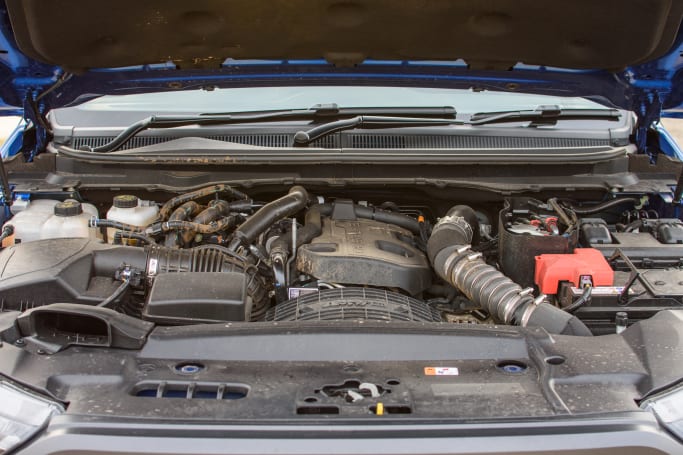
It's power figures match or exceed almost everything in its class, so if its earth-moving power you're after you'll have to look to Volkswagen's Amarok which offers an incredible 3.0-litre diesel V6 with more impressive outputs (190kW/580Nm).
The Raptor can only be had with a 10-speed torque converter automatic transmission with low-range transfer case.
Looking at the size of the Raptor, you'd be forgiven for assuming the fuel consumption would float somewhere around the 20.0L/100km mark, but that's not the case at all.
While this truck's claimed/combined fuel consumption figure is an ambitious 8.2L/100km, my week-long test produced a still-very-impressive 10.1L/100km. Not bad at all.
This is helped along by the 10-speed auto which only makes use of its highest ratio at freeway speeds.
The Raptor gets the same recent Ranger upgrades, meaning the inclusion of active safety items like auto emergency braking (AEB), lane keep assist (LKAS) with lane departure warning (LDW), and traffic sign recognition (TSR).
Unlike the Wildtrak, there's no active cruise control. Ford tells us this is because the overhauled bumper prevents the installation of the radar system required.
Other refinements more suited to off-roading include hill descent control, hill launch assist, 'load adaptive control' and Ford's 'terrain management' suite with six modes. There's also trailer sway control and roll over mitigation.
Six airbags (including rear curtain) round out the Ranger's safety gear, and the Sync3 software will automatically call emergency services if they are deployed.
All Ranger variants carry a maximum five-star ANCAP safety rating as of 2015.
Basic Warranty
5 years / unlimited km warranty
ANCAP Safety Rating

The Raptor is covered by the same five-year/unlimited kilometer warranty as other new Fords, and this comes with a few small bonuses like roadside assist, state auto club membership and a free loan car at every service.
Services for 2.0-litre turbo Rangers happen once yearly or every 15,000km, whichever occurs first. Services are covered by capped prices that extend out to 12 years, the first four of which come in at $299 with the fifth costing $365. Prices ramp up after that, with some services costing $705.
The yearly average for the life of the five-year warranty period is a reasonable $312.20, although this price is not totally inclusive of a long list of optional extras.
It's near impossible to not enjoy driving the Raptor. It feels monstrous, like you're the toughest thing on the road. It's how Ford probably wants you to feel, and as much as I thought the novelty would wear off quickly, it didne't. At the end of my drive week I didn't want to give the keys back.
It starts with the seating position, which (once you've clambered up into it) is fantastic, then there's the touch points of the big chunky steering wheel and dominating view of the road.
You're easily the road's apex predator, at least amongst passenger vehicles, with the Raptor giving you the ability to peer over even the most massive of SUVs.
The dominating position on the road has the downside of being decidedly nerve-wracking when it comes to being sandwiched by semi-trailers on the freeway. The Raptor only just fits in most lanes, especially around cities.
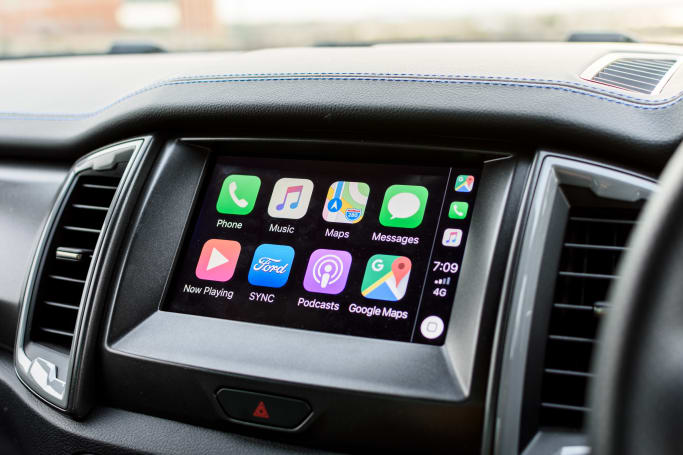
Like other Rangers, the steering is super-light, betraying this car's massive tyres. It feels as easy to maneuver as any run-of-the-mill SUV, although you do lose a bit of road feel from the giant tyres to the suspension, to the overly assisted steering, so it's not without cost.
As much as internet commentary talks down the 2.0-litre engine, it proved smooth and more than powerful enough for daily duties. In 2H it will even get the rear wheels spinning, so it easily has enough torque to deal with its own weight.
The 10-speed auto is remarkably smooth, and despite an abundance of ratios, was only really caught off-guard in more complicated cornering scenarios.
Then there's the Raptor's key feature - the Fox shocks. These aren't just capable, they're astoundingly comfortable around town. Forget ladder-chassis jiggle, forget road surfaces or imperfections, the Raptor does away with every ride compromise you might associate with a dual-cab.
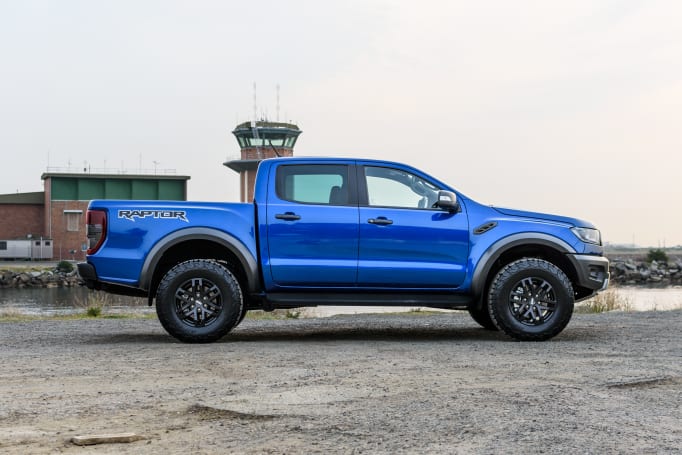
It's like driving a gigantic car. Almost like an S-Class that can also go anywhere. You won't feel potholes, or speed bumps or even the tread of the tyres themselves.
It leads to other benefits, too. This is possibly the quietest dual-cab on the market. I say that knowing that V6 versions of the Amarok are perhaps the only thing that can give the Raptor a run for its money when it comes to refinement.
Capable and comfortable, with enough power to at very least get by? Apart from its huge dimensions that make city-slicking trickier than it perhaps needs to be, what's not to like?
The Ranger Raptor represents more than just a kitted up dual cab, it's the first poster truck for generation ute, which Australia is now well and truly in.
Say what you will about its engine, it packs a strong set of features backed by monstrous off-road ability. What's more, it's the most comfortable dual cab you can be behind the wheel of – so long as you're okay watching your edges around the 'burbs.
| Vehicle | Specs | Price* | |
|---|---|---|---|
| XL 2.2 LOW Rider (4X2) | 2.2L, Diesel, 6 SP MAN | No recent listings | 2020 Ford Ranger 2020 XL 2.2 LOW Rider (4X2) Pricing and Specs |
| XL 3.2 (4X4) | 3.2L, Diesel, 6 SP AUTO | No recent listings | 2020 Ford Ranger 2020 XL 3.2 (4X4) Pricing and Specs |
| XL 2.2 Hi-Rider (4x2) | 2.2L, Diesel, 6 SP AUTO | No recent listings | 2020 Ford Ranger 2020 XL 2.2 Hi-Rider (4x2) Pricing and Specs |
| XL 2.2 (4X4) | 2.2L, Diesel, 6 SP AUTO | No recent listings | 2020 Ford Ranger 2020 XL 2.2 (4X4) Pricing and Specs |
| Price and features | 7 |
|---|---|
| Design | 9 |
| Practicality | 8 |
| Under the bonnet | 7 |
| Efficiency | 8 |
| Safety | 8 |
| Ownership | 7 |
| Driving | 8 |
$16,880
Lowest price, based on 1251 car listings in the last 6 months